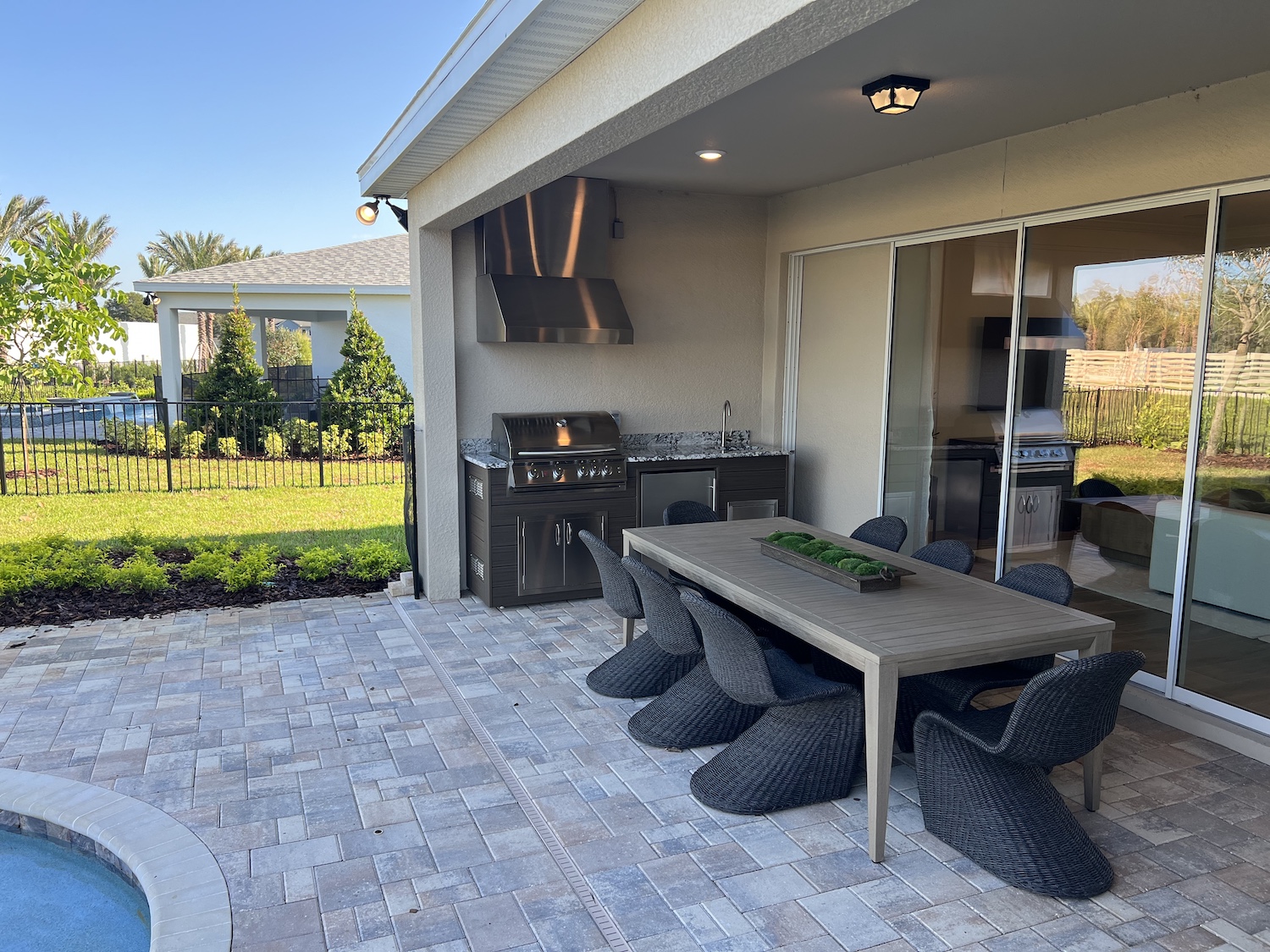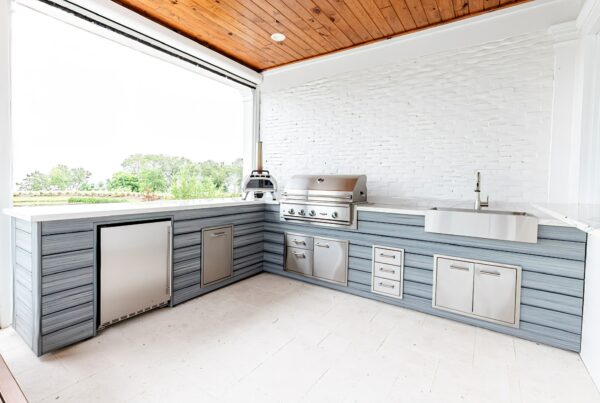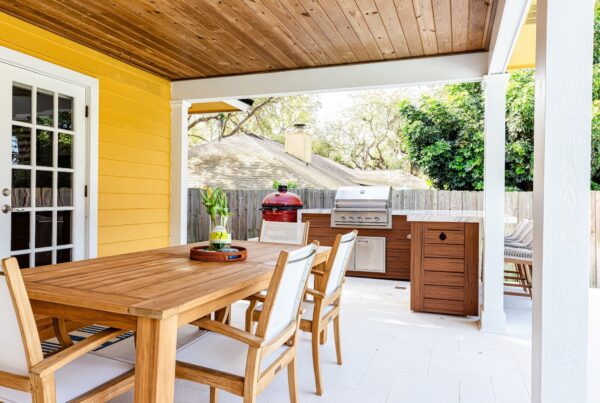The material you choose for your outdoor kitchen countertop not only contributes to the overall aesthetics of your unit, but plays a factor in maintenance and longevity as well. Explore three top countertop choices we recommend for your outdoor kitchen: granite, porcelain, and Dekton. Additionally, learn why we suggest outdoor kitchen builders stay away from marble, quartz, and tile options.
Advantages of Granite Countertops
Granite has long been a favored choice for outdoor kitchen countertops, and for good reason. This natural stone offers a blend of durability, heat resistance, and timeless aesthetics that make it a standout choice.
Durability: Granite countertops are renowned for their durability. They can withstand the rigors of outdoor use, including exposure to varying weather conditions.
Heat Resistance: For those who love to cook outdoors, granite is a top pick. It’s exceptionally heat-resistant, so you can place hot pots and pans directly on the surface without worry.
Unique Look: Granite’s unique, natural patterns and colors add a touch of elegance to your outdoor kitchen. Each slab is one-of-a-kind, making your outdoor space truly distinctive.
Low Maintenance: Maintaining granite is a breeze. Regular sealing and cleaning keep it looking pristine for years to come.
Porcelain Countertops for Outdoor Kitchens
Porcelain countertops are gaining popularity in outdoor kitchen designs for their impressive combination of durability and style.
High Durability: Porcelain countertops are exceptionally durable, able to withstand the elements and heavy use without showing signs of wear.
Stain Resistance: They are highly resistant to staining, making them perfect for outdoor cooking areas where spills are inevitable.
Wide Range of Designs: Porcelain comes in a vast array of designs and colors, allowing you to achieve the perfect aesthetic for your outdoor kitchen.
Easy to Clean: Cleaning porcelain countertops is a breeze, thanks to their non-porous surface that repels stains and dirt.
The Appeal of Dekton Countertops
Dekton countertops are a relatively newer addition to the outdoor kitchen scene, but they’ve quickly become a favorite due to their outstanding properties.
Extreme Durability: Dekton countertops are virtually indestructible. They can handle extreme temperature changes and are resistant to scratches and impacts.
Resistance to UV Rays: These countertops won’t fade or deteriorate when exposed to harsh sunlight, ensuring they maintain their beauty over time.
Non-Porous Surface: Dekton’s non-porous surface makes it highly resistant to stains and easy to clean, even in outdoor environments.
Modern Aesthetics: Dekton offers a sleek and modern look that complements contemporary outdoor kitchen designs.
Countertops to Avoid in Outdoor Kitchens
While there is a wide range of countertop materials available on the market, not all are well-suited for the unique challenges posed by outdoor kitchens. Here are three countertop materials to steer clear of when planning your outdoor culinary haven:
Marble
Marble countertops are renowned for their luxurious appearance and timeless elegance. However, when it comes to outdoor use, they come with several drawbacks that make them less than ideal.
Susceptibility to Staining: Marble is a porous stone, which means it’s highly susceptible to staining. In an outdoor setting where spills, food splatters, and the elements are common, maintaining the pristine appearance of marble can be a constant struggle.
Vulnerability to Outdoor Elements: Outdoor kitchens are exposed to a wide range of environmental conditions, including UV radiation, rain, and temperature fluctuations. Marble is sensitive to these elements and can degrade over time, losing its natural luster.
Quartz
Quartz countertops are known for their versatility and durability in indoor spaces. However, they may not be the best choice for outdoor kitchens, primarily due to their limitations in handling outdoor conditions.
Limited Heat Resistance: While quartz is generally heat-resistant, it may not fare as well in the extreme heat that outdoor surfaces can experience when exposed to direct sunlight for extended periods. Hot cookware or grilling utensils can potentially cause discoloration or damage.
Potential Fading in Sunlight: Over time, quartz countertops can fade or change color when exposed to prolonged sunlight. This can result in an uneven appearance that detracts from the overall aesthetic of your outdoor kitchen.
Tile
Tile countertops can be a popular choice for indoor kitchens, thanks to their versatility and endless design options. However, they present some challenges when used in outdoor environments.
Grout Maintenance: Tile countertops require grout, which can be a magnet for dirt, debris, and mold in outdoor settings. Maintaining clean grout lines can become an ongoing task, potentially detracting from the overall enjoyment of your outdoor kitchen.
Fragility in Harsh Weather Conditions: Tiles are more fragile than solid surfaces like granite, porcelain, or Dekton. In regions with freezing temperatures, the expansion and contraction of tiles can lead to cracks and damage over time.
Factors to Consider When Choosing an Outdoor Kitchen Countertop
When selecting your outdoor kitchen countertop, consider factors such as your budget, local climate, and maintenance requirements. Each of these factors can influence your decision. Talk to your outdoor kitchen builder about any goals or concerns you may have to get the perfect surface for your kitchen. .
Maintenance Tips for Outdoor Kitchen Countertops
To ensure your outdoor kitchen countertops remain in top condition, follow these maintenance tips:
Granite countertops require periodic sealing and regular cleaning.
Porcelain countertops need little maintenance but benefit from regular cleaning.
Dekton countertops are low-maintenance, but still benefit from routine cleaning.
The choice of countertop material for your outdoor kitchen is a decision that should not be taken lightly. Granite, porcelain, and Dekton offer distinct advantages, ensuring your outdoor kitchen not only looks stunning but also stands the test of time. Conversely, marble, quartz, and tile may prove less suitable in outdoor environments due to their unique vulnerabilities. By considering your needs, budget, and local conditions, you can select the perfect countertop material that complements your outdoor culinary oasis.
Ready to transform your backyard? Contact us today for expert advice and assistance in building the outdoor kitchen of your dreams. Your culinary adventures await!




